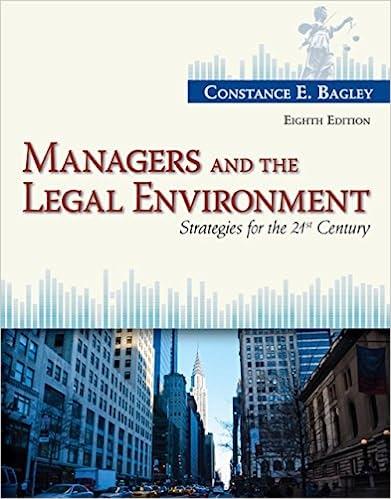The term resource curse describes the situation in which a poor country blessed with oil, natural gas,
Question:
The term resource curse describes the situation in which a poor country "blessed" with oil, natural gas, and minerals sells these resources to foreign nations in exchange for money that just "lin[es] the pockets of the rich," instead of benefiting the country or its poor citizens. To address this situation, the Dodd-Frank Act added section 13(q) to the Securities Exchange Act of 1934. This section directs the Securities and Exchange Commission (SEC) "to 'issue final rules that require each resource extraction issuer' . . . 'to include in an annual report . . . information relating to any payment made . . . to a foreign government or the [U.S.] government for the purpose of the commercial development of oil, natural gas, or minerals.'" A subsection requires that, "[t]o the extent practicable, the Commission shall make available online, to the public, a compilation of the information required to be submitted [in the annual report]." The Securities and Exchange Commission (SEC) promulgated a final rule (Disclosures of Payments by Resource Extraction Issuers) requiring that disclosures be made in a new form (Form SD), and not in "an existing Exchange Act annual report."100 The final rule included no exemptions from the disclosure requirements, even though the SEC acknowledged that the lack of an exemption could cost certain companies "billions of dollars" and "significant[ly] impact" their profits and competitive positions. After doing a cost-benefit analysis, the SEC had concluded that the burden was "necessary" to "further" the purposes of the act.
Numerous oil, gas, and mining companies challenged the rule, asserting that it violated the First Amendment and the Administrative Procedure Act (APA). They claimed that the SEC had "erroneously" read section 13(q) to require public disclosure and that the rule was arbitrary and capricious because it did not include an exemption for countries that prohibited such public disclosures by law.
When reviewing the rule, the U.S. District Court for the District of Columbia noted that when reviewing an agency action under the APA, the "district judge sits as an appellate tribunal" and the entire case is a "question of law." Agency actions that are "arbitrary, capricious . . . or otherwise not in accordance with law" must be held "unlawful." The district court concluded that the SEC had "misread the statute to mandate public disclosure of the reports" and that the rule was arbitrary and capricious because it denied "any exemption" for countries with laws that prohibited disclosure of such payments. The court also held that the rationale on which the SEC based the no-exemption rule was not "reasoned decision-making" and that a "fuller analysis" of the "burdens on competition" was warranted.
When deciding whether an agency "misread" a statute, what factors does a court review? Does a court look at the statute subsection by subsection, or as a whole? Are individual words within a statute examined for their usual dictionary meanings? Although a court typically affords deference to an agency decision, what happens when the court believes the agency's decision is based on "an erroneous view of the law" rather than a "permissible construction of the statute"? In your opinion, is section 13(q) good public policy? Is the SEC's implementation of it good policy?
Step by Step Answer:

Managers And The Legal Environment Strategies For The 21st Century
ISBN: 9781285860374
8th Edition
Authors: Constance E. Bagley





